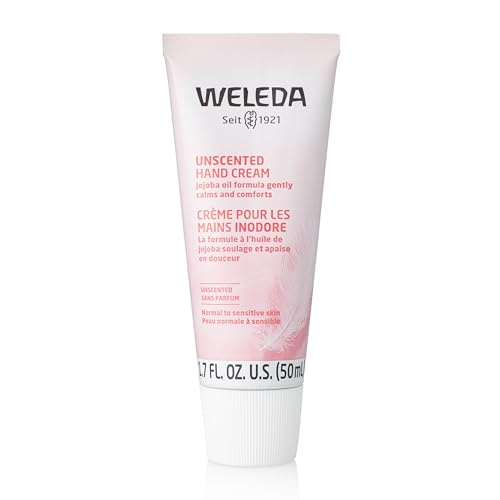
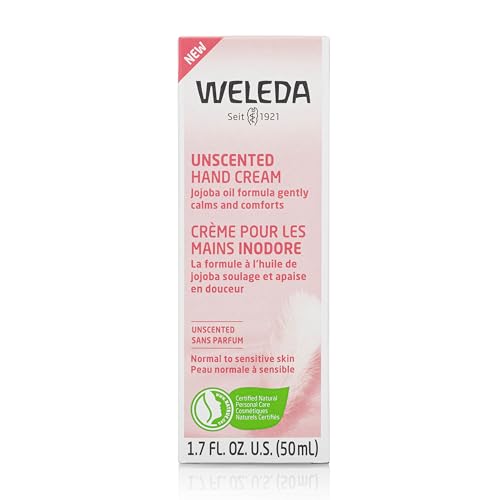
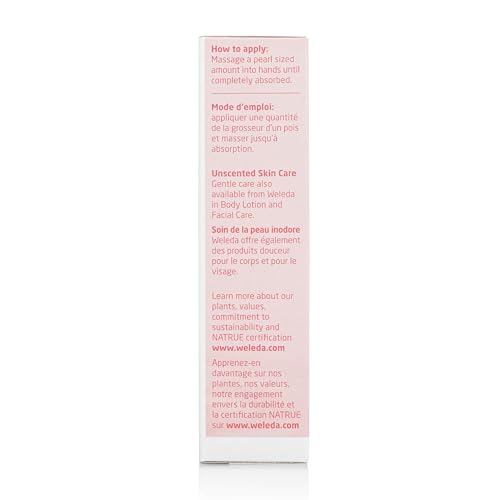
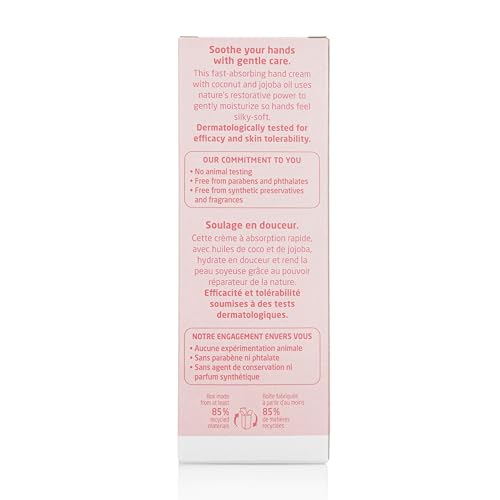
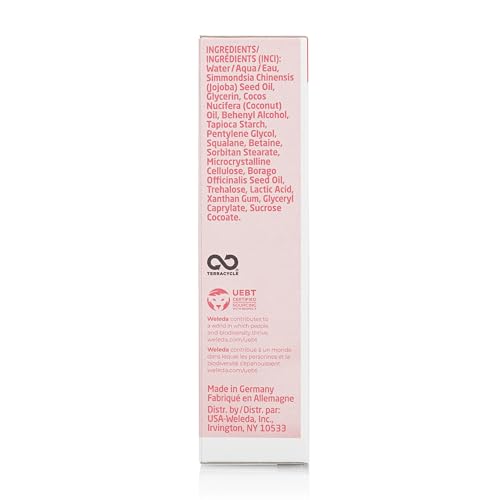
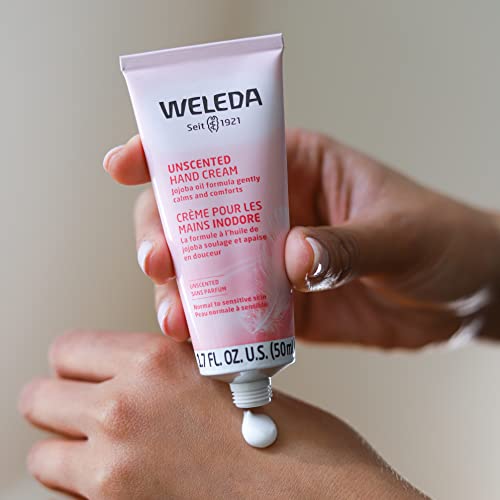
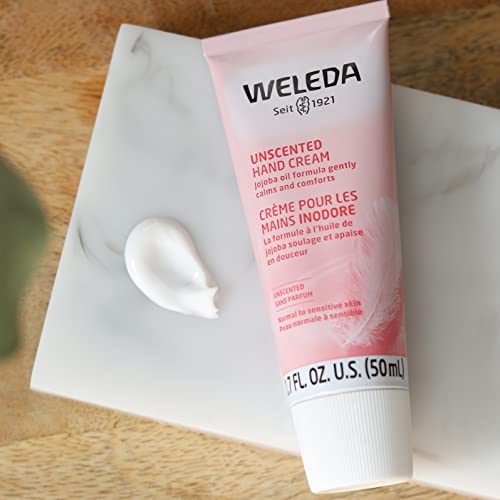
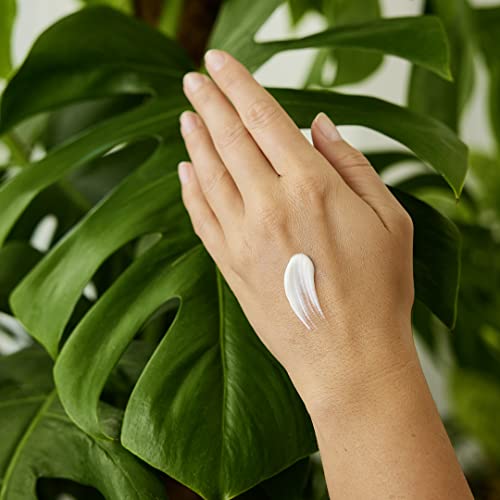

Weleda Unscented Hand Cream - Moisturizes with Jojoba, Borage & Coconut Oils - 1.7oz


Lactic Acid, L
High RiskLactic acid is an organic acid commonly used in cosmetics and skincare products as an exfoliant and pH regulator. It helps in improving skin texture and hydration by promoting the shedding of dead skin cells and enhancing moisture retention.
Sustai Insights
Lactic acid offers functional benefits as an effective exfoliant and moisturizer, contributing to improved skin appearance. However, it poses potential risks, including skin irritation and enhanced absorption, which may lead to adverse effects. Regulatory bodies have noted use restrictions due to these concerns. Overall, the ingredient is considered high risk, necessitating cautious usage, particularly for sensitive skin. Alternatives like glycolic acid may provide similar benefits with potentially lower irritation.
Betaine
Medium RiskBetaine is a zwitterion (inner salt) commonly used in personal care and cosmetic products. It functions primarily as a humectant, aiding in moisture retention, and can also act as a surfactant, contributing to the cleansing properties of formulations.
Sustai Insights
Betaine is recognized for its effective moisturizing and surfactant properties, making it beneficial in enhancing product performance. It is generally considered low risk for health concerns such as carcinogenicity, allergies, and reproductive toxicity. However, there are multiple additive exposure sources to consider. Environmentally, it poses low risks regarding pollution and bioaccumulation. Regulatory status indicates it is approved for use with no significant restrictions. Overall, it presents a medium risk level, and safe usage practices should be observed. Alternatives include glycerin or sorbitol for similar benefits.
Tapioca Starch
Low RiskTapioca starch is a carbohydrate extracted from the cassava root, primarily used as a thickening agent in food products and as a binding agent in various formulations. It is known for its ability to provide a smooth texture and enhance the consistency of products.
Sustai Insights
Tapioca starch offers functional benefits such as serving as an effective thickener and stabilizer in food and cosmetic formulations. It is derived from a renewable source and is biodegradable, contributing to sustainability. Health risks are minimal, with low concerns regarding carcinogenicity, allergenic potential, and reproductive toxicity. Environmental risks are also low, with no significant pollutants or bioaccumulation identified. Regulatory bodies, including the FDA, have approved its use without significant restrictions. Overall, tapioca starch presents a low risk profile, making it a safe ingredient in various applications.
Water
Low RiskWater is a clear, colorless liquid essential for various biological processes. It serves as a solvent in formulations, facilitating the dissolution of other ingredients and enhancing product texture and application. Additionally, water plays a crucial role in hydration and is a key component in many cosmetic and personal care products.
Sustai Insights
Water is an effective solvent and hydrator, contributing to the texture and efficacy of formulations. It is biodegradable and generally regarded as safe, with low concerns regarding carcinogenicity, allergies, and reproductive toxicity. However, excessive water usage can lead to environmental concerns, particularly regarding resource depletion. Regulatory bodies do not impose restrictions on water use in cosmetics. Overall, the risks associated with water are low, making it a safe and essential ingredient.
Glyceryl Caprylate
Low RiskGlyceryl caprylate is a monoester of glycerin and caprylic acid, commonly used in cosmetics and personal care products as an emulsifier and skin-conditioning agent. It helps stabilize formulations and improve the texture and feel on the skin.
Sustai Insights
Glyceryl caprylate offers functional benefits as an effective emulsifier and skin-conditioning agent, enhancing product performance. It is biodegradable and considered sustainably sourced. Health risks are low, with minimal concerns regarding carcinogenicity, allergenic potential, and endocrine disruption. Environmental risks are also low, with no significant pollutant or bioaccumulation potential identified. Regulatory status is favorable, with no major restrictions. Overall, glyceryl caprylate maintains a low risk profile, making it a suitable ingredient for use in cosmetic formulations.
Behenyl Alcohol
Low RiskBehensyl alcohol is a saturated fatty alcohol obtained from the seeds of the Ben oil plant. It is primarily used as an emollient, emulsifier, and thickening agent in various cosmetic and personal care formulations.
Sustai Insights
Behensyl alcohol offers functional benefits such as improving product texture and stability. It is considered to have low health risks, with minimal concerns regarding carcinogenicity, allergies, and reproductive toxicity. Environmentally, it poses low risks as a pollutant and is not bioaccumulative. Regulatory bodies have not issued significant warnings. Overall, it is assessed to have a low risk profile. Safe usage involves adhering to recommended concentrations, and potential alternatives include other fatty alcohols that may provide similar benefits.
Sorbitan Stearate
Low RiskSorbitan stearate is a surfactant composed of sorbitol and stearic acid. It is commonly used as an emulsifier in cosmetics and personal care products, aiding in the blending of oil and water-based ingredients, enhancing texture and stability.
Sustai Insights
Sorbitan stearate serves effectively as an emulsifier, enhancing product stability and texture. It is considered low risk for health concerns such as carcinogenicity and allergies. Environmental impacts are minimal, with no evidence of bioaccumulation or significant pollution. Regulatory bodies have not flagged this ingredient for use restrictions. Overall, it is assessed as low risk, with no major health or environmental concerns noted, making it a viable choice in formulations.
Cocos Nucifera (Coconut) Oil
Low RiskCocos Nucifera (Coconut) Oil is derived from the kernels of the coconut palm. It is primarily used in cosmetic formulations for its emollient and moisturizing properties, making it suitable for skin and hair care products.
Sustai Insights
Coconut oil serves as an effective moisturizer and emollient, promoting skin hydration and softness. It is sustainably sourced and biodegradable. Health risks are minimal, with low concerns regarding carcinogenicity, allergens, and reproductive toxicity. Environmental impact is also low, as it does not contribute significantly to pollution or bioaccumulation. Regulatory bodies have not issued restrictions on its use. Overall, coconut oil presents a low risk for health and environmental concerns, making it a safe ingredient in cosmetic products.
Borago Officinalis (Borage) Seed Oil
Low RiskBorago officinalis (borage) seed oil is an oil derived from the seeds of the borage plant, known for its high content of gamma-linolenic acid (GLA). It is commonly used in cosmetic formulations for its moisturizing properties and potential to improve skin barrier function.
Sustai Insights
Borage seed oil is valued for its moisturizing benefits and is considered sustainably sourced. It has a low risk of causing health issues, including carcinogenicity, allergies, or reproductive toxicity. Environmental risks appear minimal, with no significant concerns related to bioaccumulation or pollution. Regulatory bodies do not impose significant restrictions on its use. Overall, the ingredient is assessed as low risk, making it a suitable option in cosmetic products.
Cellulose
Low RiskCellulose is a natural polysaccharide derived from plant cell walls, primarily used as a thickening agent, stabilizer, and emulsifier in cosmetic formulations. It is known for its ability to improve texture and consistency in products.
Sustai Insights
Cellulose serves as an effective thickening and stabilizing agent, enhancing product texture while being biodegradable and derived from renewable sources. Health risks are minimal, with low concerns regarding carcinogenicity, allergies, and reproductive toxicity. Environmental impacts are also low, as cellulose does not contribute significantly to pollution or bioaccumulation. Regulatory agencies have not issued restrictions on its use. Overall, cellulose presents a low risk profile, making it a suitable ingredient choice in cosmetics.
Pentylene Glycol
Low RiskPentylene glycol is a synthetic, low molecular weight glycol that functions primarily as a humectant, solvent, and skin-conditioning agent in cosmetic formulations. It is commonly used to enhance product texture and moisture retention.
Sustai Insights
Pentylene glycol offers functional benefits as a humectant, effectively attracting moisture to the skin. It is generally considered to have low health risks, with minimal concerns regarding carcinogenicity, allergies, or developmental toxicity. However, it may cause mild skin, eye, or lung irritation in sensitive individuals. Environmentally, it poses low risk as it is not bioaccumulative or a significant pollutant. Regulatory bodies have not imposed restrictions on its use. Overall, it presents a low risk profile, making it a safe choice in cosmetic formulations, with no significant adverse effects reported.
Sucrose Cocoate
Low RiskSucrose cocoate is a mixture of sucrose esters derived from sucrose and coconut fatty acids. It serves primarily as an emulsifier and surfactant in cosmetic formulations, enhancing texture and aiding in the dispersion of other ingredients.
Sustai Insights
Sucrose cocoate functions effectively as an emulsifier, improving product stability and texture. It is biodegradable and derived from sustainable sources, contributing positively to environmental considerations. Health risks are minimal, with low concerns for carcinogenicity, allergies, and reproductive toxicity. No significant environmental hazards or regulatory warnings are noted, leading to an overall low risk assessment. For safe usage, it is advisable to adhere to recommended concentrations in formulations. Alternatives such as other plant-based emulsifiers may provide similar benefits while maintaining sustainability.
Vegetarian Glycerin
Low RiskVegetarian glycerin, also known as glycerol, is a colorless, odorless, and viscous liquid derived from plant sources. It is primarily used as a humectant, solvent, and emollient in various personal care products, helping to retain moisture and improve texture.
Sustai Insights
Vegetarian glycerin offers functional benefits as an effective humectant, promoting hydration and skin smoothness. It is biodegradable and typically sustainably sourced. Health risks associated with glycerin are low, with no significant concerns for carcinogenicity, allergens, or reproductive toxicity. Environmental risks are minimal, and it is not subject to major regulatory warnings. Overall, the risk level for this ingredient is low, making it a safe choice in formulations. Safe usage practices include ensuring proper concentrations in products, and alternatives such as propylene glycol exist but may have differing properties.
Squalane Oil
Low RiskSqualane oil is a lightweight, colorless oil derived from olive or sugarcane that is commonly used in cosmetic formulations. It functions primarily as a moisturizer and emollient, enhancing skin hydration while imparting a silky texture to products. Squalane is also known for its stability and resistance to oxidation, making it a favored ingredient in skincare.
Sustai Insights
Squalane oil is recognized for its effective moisturizing properties and is sustainably sourced, often derived from olives or sugarcane, contributing to its eco-friendly profile. Health risks are minimal, with low concerns for carcinogenicity, allergies, or reproductive toxicity. Environmental impact is also low, as it is not known to bioaccumulate or pollute. Regulatory bodies have not placed restrictions on its use. Overall, the ingredient poses a low risk, making it a safe option in cosmetic products. Alternatives such as jojoba oil or other plant-based emulsifiers may offer similar benefits.
Simmondsia Chinensis (Jojoba)
Low RiskSimmondsia chinensis, commonly known as jojoba, is an oil derived from the seeds of the jojoba plant. It is commonly used in cosmetic formulations for its moisturizing properties, acting as an emollient and skin conditioning agent.
Sustai Insights
Jojoba oil offers functional benefits such as effective skin moisturization and is biodegradable, with sustainable sourcing practices. Health risks are low, with minimal concerns regarding carcinogenicity, allergies, and reproductive toxicity. Environmental impact is negligible, with no pollutant or bioaccumulation potential. Regulatory status is favorable with no significant restrictions noted. Overall, it is assessed as low risk, and safe usage practices should be maintained. Alternatives include other plant-derived oils like argan or almond oil, which may provide similar benefits.
Trehalose
Low RiskTrehalose is a disaccharide composed of two glucose molecules. It occurs naturally in various organisms and is utilized in cosmetic formulations primarily for its moisturizing properties and ability to stabilize proteins and cellular structures.
Sustai Insights
Trehalose offers functional benefits as a humectant and stabilizer, promoting hydration and preserving product integrity. It is considered low risk concerning health impacts, with minimal concerns regarding carcinogenicity, allergies, or reproductive toxicity. Environmentally, it shows low pollutant potential and is biodegradable. Regulatory assessments indicate no significant restrictions. Safe usage practices should be followed, but alternatives are limited. Overall, trehalose presents a low risk profile.
Tapioca Starch
Low RiskTapioca starch is a carbohydrate extracted from the cassava root, primarily used as a thickening agent in food products and as a binding agent in various formulations. It is known for its ability to provide a smooth texture and enhance the consistency of products.
Sustai Insights
Tapioca starch offers functional benefits such as serving as an effective thickener and stabilizer in food and cosmetic formulations. It is derived from a renewable source and is biodegradable, contributing to sustainability. Health risks are minimal, with low concerns regarding carcinogenicity, allergenic potential, and reproductive toxicity. Environmental risks are also low, with no significant pollutants or bioaccumulation identified. Regulatory bodies, including the FDA, have approved its use without significant restrictions. Overall, tapioca starch presents a low risk profile, making it a safe ingredient in various applications.
Water
Low RiskWater is a clear, colorless liquid essential for various biological processes. It serves as a solvent in formulations, facilitating the dissolution of other ingredients and enhancing product texture and application. Additionally, water plays a crucial role in hydration and is a key component in many cosmetic and personal care products.
Sustai Insights
Water is an effective solvent and hydrator, contributing to the texture and efficacy of formulations. It is biodegradable and generally regarded as safe, with low concerns regarding carcinogenicity, allergies, and reproductive toxicity. However, excessive water usage can lead to environmental concerns, particularly regarding resource depletion. Regulatory bodies do not impose restrictions on water use in cosmetics. Overall, the risks associated with water are low, making it a safe and essential ingredient.
Glyceryl Caprylate
Low RiskGlyceryl caprylate is a monoester of glycerin and caprylic acid, commonly used in cosmetics and personal care products as an emulsifier and skin-conditioning agent. It helps stabilize formulations and improve the texture and feel on the skin.
Sustai Insights
Glyceryl caprylate offers functional benefits as an effective emulsifier and skin-conditioning agent, enhancing product performance. It is biodegradable and considered sustainably sourced. Health risks are low, with minimal concerns regarding carcinogenicity, allergenic potential, and endocrine disruption. Environmental risks are also low, with no significant pollutant or bioaccumulation potential identified. Regulatory status is favorable, with no major restrictions. Overall, glyceryl caprylate maintains a low risk profile, making it a suitable ingredient for use in cosmetic formulations.
Lactic Acid, L
High RiskLactic acid is an organic acid commonly used in cosmetics and skincare products as an exfoliant and pH regulator. It helps in improving skin texture and hydration by promoting the shedding of dead skin cells and enhancing moisture retention.
Sustai Insights
Lactic acid offers functional benefits as an effective exfoliant and moisturizer, contributing to improved skin appearance. However, it poses potential risks, including skin irritation and enhanced absorption, which may lead to adverse effects. Regulatory bodies have noted use restrictions due to these concerns. Overall, the ingredient is considered high risk, necessitating cautious usage, particularly for sensitive skin. Alternatives like glycolic acid may provide similar benefits with potentially lower irritation.
Behenyl Alcohol
Low RiskBehensyl alcohol is a saturated fatty alcohol obtained from the seeds of the Ben oil plant. It is primarily used as an emollient, emulsifier, and thickening agent in various cosmetic and personal care formulations.
Sustai Insights
Behensyl alcohol offers functional benefits such as improving product texture and stability. It is considered to have low health risks, with minimal concerns regarding carcinogenicity, allergies, and reproductive toxicity. Environmentally, it poses low risks as a pollutant and is not bioaccumulative. Regulatory bodies have not issued significant warnings. Overall, it is assessed to have a low risk profile. Safe usage involves adhering to recommended concentrations, and potential alternatives include other fatty alcohols that may provide similar benefits.
Sorbitan Stearate
Low RiskSorbitan stearate is a surfactant composed of sorbitol and stearic acid. It is commonly used as an emulsifier in cosmetics and personal care products, aiding in the blending of oil and water-based ingredients, enhancing texture and stability.
Sustai Insights
Sorbitan stearate serves effectively as an emulsifier, enhancing product stability and texture. It is considered low risk for health concerns such as carcinogenicity and allergies. Environmental impacts are minimal, with no evidence of bioaccumulation or significant pollution. Regulatory bodies have not flagged this ingredient for use restrictions. Overall, it is assessed as low risk, with no major health or environmental concerns noted, making it a viable choice in formulations.
Cocos Nucifera (Coconut) Oil
Low RiskCocos Nucifera (Coconut) Oil is derived from the kernels of the coconut palm. It is primarily used in cosmetic formulations for its emollient and moisturizing properties, making it suitable for skin and hair care products.
Sustai Insights
Coconut oil serves as an effective moisturizer and emollient, promoting skin hydration and softness. It is sustainably sourced and biodegradable. Health risks are minimal, with low concerns regarding carcinogenicity, allergens, and reproductive toxicity. Environmental impact is also low, as it does not contribute significantly to pollution or bioaccumulation. Regulatory bodies have not issued restrictions on its use. Overall, coconut oil presents a low risk for health and environmental concerns, making it a safe ingredient in cosmetic products.
Borago Officinalis (Borage) Seed Oil
Low RiskBorago officinalis (borage) seed oil is an oil derived from the seeds of the borage plant, known for its high content of gamma-linolenic acid (GLA). It is commonly used in cosmetic formulations for its moisturizing properties and potential to improve skin barrier function.
Sustai Insights
Borage seed oil is valued for its moisturizing benefits and is considered sustainably sourced. It has a low risk of causing health issues, including carcinogenicity, allergies, or reproductive toxicity. Environmental risks appear minimal, with no significant concerns related to bioaccumulation or pollution. Regulatory bodies do not impose significant restrictions on its use. Overall, the ingredient is assessed as low risk, making it a suitable option in cosmetic products.
Cellulose
Low RiskCellulose is a natural polysaccharide derived from plant cell walls, primarily used as a thickening agent, stabilizer, and emulsifier in cosmetic formulations. It is known for its ability to improve texture and consistency in products.
Sustai Insights
Cellulose serves as an effective thickening and stabilizing agent, enhancing product texture while being biodegradable and derived from renewable sources. Health risks are minimal, with low concerns regarding carcinogenicity, allergies, and reproductive toxicity. Environmental impacts are also low, as cellulose does not contribute significantly to pollution or bioaccumulation. Regulatory agencies have not issued restrictions on its use. Overall, cellulose presents a low risk profile, making it a suitable ingredient choice in cosmetics.
Pentylene Glycol
Low RiskPentylene glycol is a synthetic, low molecular weight glycol that functions primarily as a humectant, solvent, and skin-conditioning agent in cosmetic formulations. It is commonly used to enhance product texture and moisture retention.
Sustai Insights
Pentylene glycol offers functional benefits as a humectant, effectively attracting moisture to the skin. It is generally considered to have low health risks, with minimal concerns regarding carcinogenicity, allergies, or developmental toxicity. However, it may cause mild skin, eye, or lung irritation in sensitive individuals. Environmentally, it poses low risk as it is not bioaccumulative or a significant pollutant. Regulatory bodies have not imposed restrictions on its use. Overall, it presents a low risk profile, making it a safe choice in cosmetic formulations, with no significant adverse effects reported.
Sucrose Cocoate
Low RiskSucrose cocoate is a mixture of sucrose esters derived from sucrose and coconut fatty acids. It serves primarily as an emulsifier and surfactant in cosmetic formulations, enhancing texture and aiding in the dispersion of other ingredients.
Sustai Insights
Sucrose cocoate functions effectively as an emulsifier, improving product stability and texture. It is biodegradable and derived from sustainable sources, contributing positively to environmental considerations. Health risks are minimal, with low concerns for carcinogenicity, allergies, and reproductive toxicity. No significant environmental hazards or regulatory warnings are noted, leading to an overall low risk assessment. For safe usage, it is advisable to adhere to recommended concentrations in formulations. Alternatives such as other plant-based emulsifiers may provide similar benefits while maintaining sustainability.
Betaine
Medium RiskBetaine is a zwitterion (inner salt) commonly used in personal care and cosmetic products. It functions primarily as a humectant, aiding in moisture retention, and can also act as a surfactant, contributing to the cleansing properties of formulations.
Sustai Insights
Betaine is recognized for its effective moisturizing and surfactant properties, making it beneficial in enhancing product performance. It is generally considered low risk for health concerns such as carcinogenicity, allergies, and reproductive toxicity. However, there are multiple additive exposure sources to consider. Environmentally, it poses low risks regarding pollution and bioaccumulation. Regulatory status indicates it is approved for use with no significant restrictions. Overall, it presents a medium risk level, and safe usage practices should be observed. Alternatives include glycerin or sorbitol for similar benefits.
Vegetarian Glycerin
Low RiskVegetarian glycerin, also known as glycerol, is a colorless, odorless, and viscous liquid derived from plant sources. It is primarily used as a humectant, solvent, and emollient in various personal care products, helping to retain moisture and improve texture.
Sustai Insights
Vegetarian glycerin offers functional benefits as an effective humectant, promoting hydration and skin smoothness. It is biodegradable and typically sustainably sourced. Health risks associated with glycerin are low, with no significant concerns for carcinogenicity, allergens, or reproductive toxicity. Environmental risks are minimal, and it is not subject to major regulatory warnings. Overall, the risk level for this ingredient is low, making it a safe choice in formulations. Safe usage practices include ensuring proper concentrations in products, and alternatives such as propylene glycol exist but may have differing properties.
Squalane Oil
Low RiskSqualane oil is a lightweight, colorless oil derived from olive or sugarcane that is commonly used in cosmetic formulations. It functions primarily as a moisturizer and emollient, enhancing skin hydration while imparting a silky texture to products. Squalane is also known for its stability and resistance to oxidation, making it a favored ingredient in skincare.
Sustai Insights
Squalane oil is recognized for its effective moisturizing properties and is sustainably sourced, often derived from olives or sugarcane, contributing to its eco-friendly profile. Health risks are minimal, with low concerns for carcinogenicity, allergies, or reproductive toxicity. Environmental impact is also low, as it is not known to bioaccumulate or pollute. Regulatory bodies have not placed restrictions on its use. Overall, the ingredient poses a low risk, making it a safe option in cosmetic products. Alternatives such as jojoba oil or other plant-based emulsifiers may offer similar benefits.
Simmondsia Chinensis (Jojoba)
Low RiskSimmondsia chinensis, commonly known as jojoba, is an oil derived from the seeds of the jojoba plant. It is commonly used in cosmetic formulations for its moisturizing properties, acting as an emollient and skin conditioning agent.
Sustai Insights
Jojoba oil offers functional benefits such as effective skin moisturization and is biodegradable, with sustainable sourcing practices. Health risks are low, with minimal concerns regarding carcinogenicity, allergies, and reproductive toxicity. Environmental impact is negligible, with no pollutant or bioaccumulation potential. Regulatory status is favorable with no significant restrictions noted. Overall, it is assessed as low risk, and safe usage practices should be maintained. Alternatives include other plant-derived oils like argan or almond oil, which may provide similar benefits.
Trehalose
Low RiskTrehalose is a disaccharide composed of two glucose molecules. It occurs naturally in various organisms and is utilized in cosmetic formulations primarily for its moisturizing properties and ability to stabilize proteins and cellular structures.
Sustai Insights
Trehalose offers functional benefits as a humectant and stabilizer, promoting hydration and preserving product integrity. It is considered low risk concerning health impacts, with minimal concerns regarding carcinogenicity, allergies, or reproductive toxicity. Environmentally, it shows low pollutant potential and is biodegradable. Regulatory assessments indicate no significant restrictions. Safe usage practices should be followed, but alternatives are limited. Overall, trehalose presents a low risk profile.
Experience the nourishing power of Weleda Unscented Hand Cream, designed for those who prioritize skin health and sustainability. This plant-rich moisturizer combines jojoba, borage, and coconut oils to deliver silky-soft hands without irritation or synthetic ingredients.
- Gentle Hydration: Enriched with natural oils, this hand cream soothes dryness and leaves skin feeling luxuriously soft.
- Safe for Sensitive Skin: Free from fragrance and ethyl alcohol, it calms irritation for normal to sensitive skin types.
- Eco-Conscious Formula: Crafted without synthetic compounds, it features flower, fruit, and root extracts selected for their skin-loving properties.
- Versatile Use: Perfect for daily application, especially after washing hands, ensuring hydration throughout the day.
- Nighttime Nourishment: Apply a thicker layer before bed for deep hydration; consider wearing cotton gloves for enhanced overnight results.
Weleda's commitment to ethical practices and community impact underscores their dedication to providing quality skincare that aligns with your values.
Subscribe & Save with Sustai
- Best Price Guarantee: Always enjoy the lowest prices on sustainable home essentials.
- No Surprises: We’ll notify you before shipping. No hidden fees, ever.
- You’re in Charge: Change, pause, or cancel your subscription anytime with ease.
- Eco-Friendly Deliveries: Our grouped shipments mean less packaging and lower emissions.
Join us on a sustainable journey. Special offers for a limited time! Prices and promotions may change.
Recommended Products
Experience the nourishing power of Weleda Unscented Hand Cream, designed for those who prioritize skin health and sustainability. This plant-rich moisturizer combines jojoba, borage, and coconut oils to deliver silky-soft hands without irritation or synthetic ingredients.
- Gentle Hydration: Enriched with natural oils, this hand cream soothes dryness and leaves skin feeling luxuriously soft.
- Safe for Sensitive Skin: Free from fragrance and ethyl alcohol, it calms irritation for normal to sensitive skin types.
- Eco-Conscious Formula: Crafted without synthetic compounds, it features flower, fruit, and root extracts selected for their skin-loving properties.
- Versatile Use: Perfect for daily application, especially after washing hands, ensuring hydration throughout the day.
- Nighttime Nourishment: Apply a thicker layer before bed for deep hydration; consider wearing cotton gloves for enhanced overnight results.
Weleda's commitment to ethical practices and community impact underscores their dedication to providing quality skincare that aligns with your values.

You can have at most 2 Sustainable Steals products in your cart
Customer Reviews
Customers’ View
Customers appreciate the effectiveness and clean formulation of the Weleda Unscented Hand Cream, noting its suitability for sensitive skin. Many highlight the deep moisturization provided by ingredients like jojoba and coconut oils, with one user stating it hydrates their stretching skin effectively. The cream is praised for being lightweight and non-sticky, making it pleasant to use throughout the day. Additionally, buyers value the absence of synthetic compounds, reinforcing their commitment to mindful skincare. Overall, customers find this product to be both nourishing for their hands and aligned with their eco-friendly and health-conscious values.
AI-generated from the text of customer reviewsThis product is rated 4.3 of 5.0 stars.
It has received 6 reviews.




